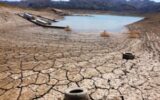Wetland ecosystems under severe drought and land use change pressure

According to Energy Press, Mohammad Reza Farzaneh stated about the important roots of Tehran’s recent air pollution crisis and the role of wetland drying and its relationship with climate change: Unfortunately, the situation in Tehran is very worrying. Tehran’s air pollution is a structural and chronic problem that has its roots in two main sources: fixed sources such as industries, power plants and refineries, and mobile sources such as worn-out cars and inefficient transportation fleets. The combination of these two, along with Tehran’s specific geography (a closed basin with temperature inversion), has caused the number of days with healthy air in Tehran to be extremely limited and insignificant. A very important point that is often overlooked is that over the years, valuable natural formations around and inside Tehran, such as invisible dams, have been tirelessly absorbing and reducing some of these pollutants and moderating their adverse effects. These ecosystem services have been vital, but unfortunately, they are being weakened and destroyed.
Severe shortage of water resources and mismanagement
He clarified: Forest parks such as Chitgar, Sorkhehesar, etc. forests are considered the lungs of Tehran. They not only help absorb carbon dioxide and produce oxygen, but also absorb suspended particles and help regulate temperature and smooth wind flow. Unfortunately, in recent years, due to severe shortage of water resources and, of course, mismanagement in irrigation and maintenance, we have witnessed widespread drying of trees in these parks. This weakness has made the trees susceptible to pest infestations, such as bark beetles, which has created a new problem for the survival of these green assets. The drying of these trees means losing natural air filters at the very time when we need them the most.
The secretary of the National Climate Change Scientific Network, referring to the situation of the country’s wetlands, said: Wetlands are valuable water bodies that have extensive ecosystem functions. One of their most important and relevant functions in the current conditions of Tehran is to prevent the creation and spread of dust. Healthy wetlands prevent them from becoming internal dust centers by keeping their soil and vegetation moist.
Referring to the international view of wetlands, he emphasized: The importance of wetlands at the global level is such that the first and most important international treaty dedicated to the protection of a specific ecosystem is the Ramsar Convention. The point is that this convention was signed in Ramsar city in 1971, with Iran as the center. This convention commits member states to protect wetlands of international importance (wetlands registered on the Ramsar list) within their territory and to ensure the sustainable use of all wetlands. Ramsar represents a global consensus on the undeniable value of wetlands for biodiversity, human livelihoods, and global environmental stability.
Wetland ecosystems under severe pressure from drought and land use change
Referring to the state of wetlands in Iran, as the country that is the birthplace of this convention, Farzaneh continued: Iran is remarkably rich in wetlands. We have a wide range of wetlands, from coastal wetlands of the Persian Gulf and the Sea of Oman to mountainous wetlands and wetlands of the central plains. So far, important wetlands in the country have been registered under the Ramsar Convention, but the number of wetlands of national importance far exceeds this number, and many have not yet been registered. Unfortunately, despite this richness and importance, Iran’s wetland ecosystems have been under severe pressure from drought, destruction, and land use change in recent decades. This situation severely threatens the environmental protection of the entire country.
Referring to the vital role and functions of wetlands, he said that they can be called a major part of ecosystem services, the most important of which include water regulation, i.e. flood control, groundwater recharge, shoreline stabilization, natural water purification and purification (removal of pollutants and excess nutrients), high primary production, organic matter production, habitat protection, i.e. vital habitat for a huge variety of plants, birds (especially migratory), fish and other animals, climate regulation, carbon storage (especially in peat soils), local temperature modulation, dust control, keeping soil moist and maintaining vegetation, preventing wind erosion and the formation of dust clusters, socio-economic values, livelihoods (fishing, marginal agriculture, tourism), cultural and aesthetic values.
A faculty member of the Institute for Environment and Sustainable Development stated in assessing the strategic role of wetlands in the era of climate change: Wetlands offer a three-pronged environmentally friendly strategy in the face of climate change, including that the adaptation aspect of wetlands helps communities adapt to the effects of climate change. For example, by absorbing and storing more severe floods, reducing the effects of drought by feeding aquifers and maintaining regional moisture, and moderating local temperatures, the mitigation aspect of wetlands, especially wetlands with organic soils (peatlands), is a huge carbon sink. They capture carbon dioxide from the atmosphere and store it in the form of organic matter in the soil. The destruction and drying of wetlands returns this carbon to the atmosphere and itself becomes a source of greenhouse gas emissions. Also, in the face of natural hazards (Disaster Risk Reduction – DRR), for Iran, which faces hazards such as flash floods, long droughts, and dust storms, wetlands are a vital natural defense shield that plays an important role in protecting the environment before a hazard occurs with a preventive approach and during and after a hazard occurs with a supportive approach.
Tags:pressure
- Comments sent by you will be published after approval by site administrators.
- Comments that contain slander will not be published.
- Comments that are not in Persian or not related to the news will not be published.

Comments
Total comments : 13 Awaiting review : 13 Date: 0